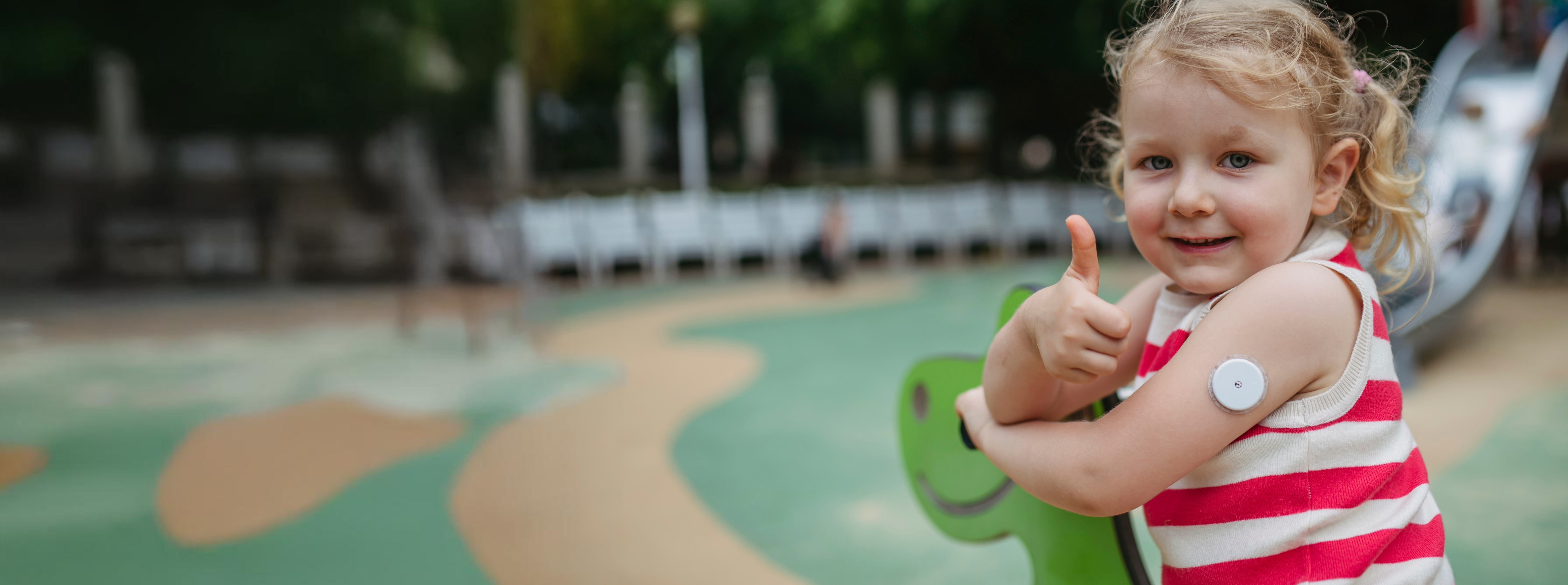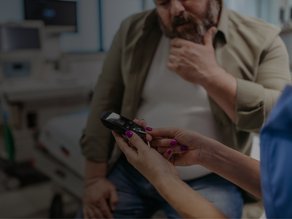Shortly after the diagnosis of type 1 diabetes

After the diagnosis
A diagnosis of type 1 diabetes is a life-changing event. It places significant demands on your body, and often requires you to absorb a large amount of information in a short time—about how you or your child can live with diabetes. This can feel overwhelming, and it’s completely normal to need time to process everything. Give yourself the space to take this journey step by step, and allow yourself time to adjust.
Diabeter is here to support you, helping you gradually gain confidence in managing type 1 diabetes.
GoOD TO KNOW
The first year after diagnosis
The first year following a type 1 diabetes diagnosis is a critical time. It lays the foundation for how diabetes will be managed over the next 10 to 15 years.
Diabeter is here to support you
If you're receiving care at one of our four treatment centers, you can reach out to us anytime—day or night—whenever you need help. We're committed to being there for you, especially in the moments that matter most.
Nutrition and diabetes
A strict diet isn’t necessary when living with diabetes. However, after diagnosis, you’ll quickly learn more about how nutrition affects your body and how to make informed food choices that support your health.
The first year
Receiving a diagnosis of type 1 diabetes is a life-changing moment. Research shows that the way diabetes is managed during the first year has a lasting impact—often shaping the next 10 to 15 years of health outcomes.
That’s why, if you're treated at one of Diabeter’s specialized diabetes centers, you’ll receive intensive support from day one. This applies equally to parents of children diagnosed with type 1 diabetes.
The Honeymoon Phase
A unique phenomenon that can occur shortly after diagnosis is the honeymoon phase. During this time, the body may still produce a small amount of insulin.
This happens because a few insulin-producing cells are still functioning. As a result, you may need to administer less insulin. However, not everyone experiences this phase, and its duration varies from person to person.
Diabeter is here to support you
Type 1 diabetes is a constant presence—24 hours a day, 7 days a week. Most of the time, you won’t have a diabetes nurse or doctor by your side.
This means that managing diabetes is largely in your own hands. We call this self-management. That’s why it’s so important to learn as much as possible about type 1 diabetes after diagnosis.
At Diabeter, we’re here to guide you every step of the way.
What You Learn in the First Few Days
We start by teaching you the most essential skills. These include:
-
Counting carbohydrates
-
Measuring blood glucose levels
-
Administering insulin
-
Managing low (hypo) and high (hyper) blood sugar levels
What You Learn in the First Few Weeks
After the first few days, you’ll begin to understand more about living with type 1 diabetes. During this time, you’ll likely start to recognize how your body responds and gain confidence in managing your condition.
We’ll also guide you through important topics like:
- Exercising safely with diabetes
- How food, stress, and sleep affect your blood glucose levels
This phase is about building knowledge and learning to listen to your body—step by step
DIABETER IS ALWAYS ACCESSIBLE
After being diagnosed with type 1 diabetes, you’ll have frequent contact with your diabetes care team at Diabeter. We offer multidisciplinary diabetes care.
This means you’ll regularly have appointments with a doctor specialized in diabetes and a diabetes nurse. You’ll also receive guidance from a dietitian and, if needed, a specialized psychologist.
For everyone receiving treatment at Diabeter, we are available daily between 11:00 AM and 12:00 PM during our telephone consultation hour.
For emergencies and urgent medical advice, we have an Emergency Line. Through this line, you’ll be directly connected to a diabetes nurse or a doctor specialized in diabetes.
Nutrition and diabetes
Type 1 diabetes is not a reason to follow a special diet. However, nutrition is very important in the treatment of diabetes. Healthy eating and a good distribution of meals throughout the day help to keep blood glucose levels balanced.
CARBOHYDRATES: THE FOUNDATION
One of the first things you learn is how to count carbohydrates. And that’s for good reason. Carbohydrates increase the amount of glucose in the blood. To be able to use that glucose in your body, insulin is needed.
To determine how much insulin is required, you count the carbohydrates in food and drinks. This is a process.
After a few weeks, you’ll begin to better understand how to distribute your meals and activities throughout the day. You’ll also gain a clearer sense of how much insulin is needed to keep glucose levels balanced.
INCREASED APPETITE AFTER TYPE 1 DIABETES DIAGNOSIS
Some people lose weight just before being diagnosed with type 1 diabetes. This can lead to an increased appetite when starting diabetes treatment. This is normal.
We call it: rebound appetite. Your body has been under strain before the diagnosis and needs to recover.
The initial period after diagnosis is therefore focused on restoring your body to health. For this, you need essential nutrients.
If you’re experiencing strong hunger, it’s wise to eat more during main meals—so more at breakfast, lunch, or dinner.
TIPS FOR SNACKS
It’s important to eat regularly to keep blood sugar levels balanced. It’s helpful to divide your food intake into three main meals and, if needed, three small snacks in between. For example:
- Fruit
- A whole grain muesli bun
- A bowl of semi-skimmed yogurt with some unsalted nuts or seeds
In most cases, you can continue eating what you did before the diagnosis. Sugar is not forbidden in type 1 diabetes. Healthy eating with diabetes is the same as regular healthy eating.
However, it’s wise to be cautious with lemonade and soft drinks, as they cause blood glucose to rise quickly. It’s better to choose light soft drinks or sugar-free lemonade. Water, coffee, or tea without sugar are also good choices.
Take the first step toward better diabetes care.
WE ARE HERE FOR YOU
Start your treatment at Diabeter



